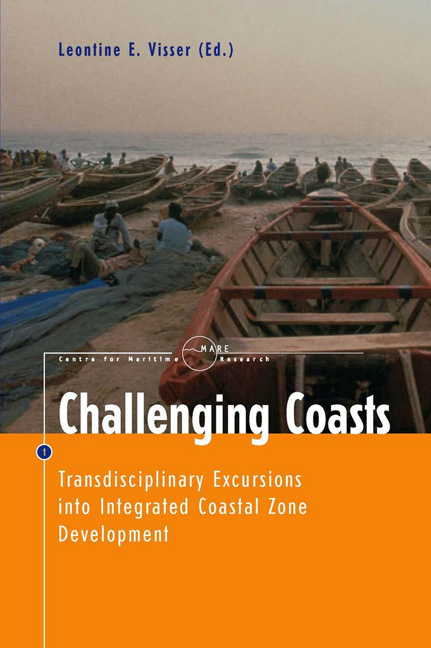Book contents
- Frontmatter
- Series Foreword
- Contents
- Acknowledgments
- 1 Introduction
- 2 Reflections on Transdisciplinarity, Integrated Coastal Development, and Governance
- 3 Biodiversity and the Natural Resource Management of Coral Reefs in Southeast Asia
- 4 A Concerted Approach towards Managing Living Resources in a Marine Protected Area
- 5 ‘Making Do’: Integrating Ecological and Societal Considerations for Marine Conservation in a Situation of Indigenous Resource Tenure
- 6 Basic Principles Underlying Research Projects on the Links between the Ecology and the Uses of Coral Reef Fishes in the Pacific
- 7 The Marine Implementation of the EC Birds and Habitats Directives: the Cases of Shipping and Oil Exploration Compared
- 8 Stakeholder Conflicts and Solutions across Political Scales: the Ibiraquera Lagoon, Brazil
- 9 ‘The Rich Eat Fish and the Poor Eat Pork’: The Decline of the Livelihoods of Handpickers of Aquatic Organisms in North Vietnam
- Index
- List of Contributors
8 - Stakeholder Conflicts and Solutions across Political Scales: the Ibiraquera Lagoon, Brazil
Published online by Cambridge University Press: 28 January 2021
- Frontmatter
- Series Foreword
- Contents
- Acknowledgments
- 1 Introduction
- 2 Reflections on Transdisciplinarity, Integrated Coastal Development, and Governance
- 3 Biodiversity and the Natural Resource Management of Coral Reefs in Southeast Asia
- 4 A Concerted Approach towards Managing Living Resources in a Marine Protected Area
- 5 ‘Making Do’: Integrating Ecological and Societal Considerations for Marine Conservation in a Situation of Indigenous Resource Tenure
- 6 Basic Principles Underlying Research Projects on the Links between the Ecology and the Uses of Coral Reef Fishes in the Pacific
- 7 The Marine Implementation of the EC Birds and Habitats Directives: the Cases of Shipping and Oil Exploration Compared
- 8 Stakeholder Conflicts and Solutions across Political Scales: the Ibiraquera Lagoon, Brazil
- 9 ‘The Rich Eat Fish and the Poor Eat Pork’: The Decline of the Livelihoods of Handpickers of Aquatic Organisms in North Vietnam
- Index
- List of Contributors
Summary
Introduction
Coastal resources are often managed by more than one agency (e.g. different branches of the government, private, and community organisations) at different political scales (local, municipal, state, national, and international) and in distinct sectors of an economy (e.g. fisheries, tourism, urban development, maritime transportation, and oil drilling). For instance, fisheries departments at any governmental level usually deal with regulations concerning only access to, and use of, fish stocks. Little attention is given to the fact that fishing areas and fishers’ livelihoods are affected by other economic activities taking place at the same time and in the same locality. This lack of co-ordination in managing coastal areas usually results in conflict among usergroups, environmental degradation, and resource overexploitation. Such situations call for an improvement in both crossscale and cross-sector efforts to develop integrated coastal management.
Efforts towards integrated coastal management may occur at different scales from the local to the national. An example of the national and state level effort is the Train-Sea-Coast Programme in Brazil which included representatives of several national and state governmental and non-governmental organisations, environmental institutions, universities, and financing agencies associated with coastal and ocean development (Reis et al. 1999). What is often missing in these nation-wide efforts, however, is input from resource users and other stakeholders. According to the Lisbon Principles (Costanza et al. 1998, 1999), full stakeholder participation in formulating and implementing decisions about environmental resources is one of the key principles for promoting sustainable governance of the oceans and coastal areas (Table 8.1). This is particularly true in the case of multifaceted conflicts about resource use, which require a participatory resolution process (Hanna and Smith 1993). User-participation in decision-making helps to increase the transparency and legitimacy of the process and, ultimately, compliance (McCay and Jentoft 1996).
Although nation-wide efforts towards integrated coastal management are important, solutions to specific problems should be tackled at the scale that matches the problem to be solved (Folke et al. 1997). Thus, efforts focusing on a particular locality using participatory approaches are likely to solve local management problems more effectively than regional or national approaches. Identifying stakeholder conflicts and their origins, together with stakeholder concerns, may be a first step towards an integrated coastal management.
- Type
- Chapter
- Information
- Challenging CoastsTransdisciplinary Excursions into Integrated Coastal Zone Development, pp. 181 - 210Publisher: Amsterdam University PressPrint publication year: 2004
- 1
- Cited by



